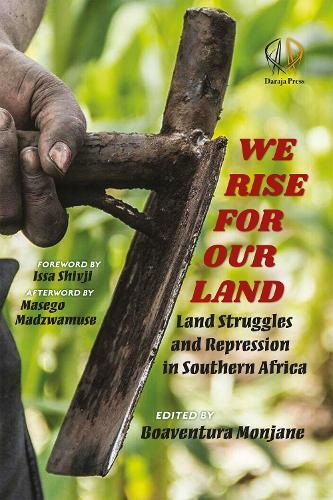Overview
In recent years southern Africa has aroused the interest of domestic and foreign investors targeting several sectors. Agrarian and extractive capital has been penetrating the countryside, causing land conflicts, displacement of local peasant communities and in worse cases, deaths. Rural people in general have not, been passive alone or in alliance with non-governmental organizations and activists, they have organized raised their voices. Resistance movements to capital are taking place throughout the region, even when faced with repression. The book provides critical assessments of the dynamics of agrarian and extractive capital in southern Africa: with contributions from DRC, Namibia, Zambia, Malawi, Zimbabwe, Swaziland, Mozambique, Mauritius and Madagascar.
Full Product Details
Author: Boaventura Monjane ,
Issa Shivji ,
Madzwamuse Masego
Publisher: Daraja Press
Imprint: Daraja Press
Dimensions:
Width: 15.20cm
, Height: 1.30cm
, Length: 22.90cm
Weight: 0.937kg
ISBN: 9781988832685
ISBN 10: 1988832683
Pages: 239
Publication Date: 01 July 2021
Audience:
General/trade
,
General
Format: Paperback
Publisher's Status: Active
Availability: Available To Order

We have confirmation that this item is in stock with the supplier. It will be ordered in for you and dispatched immediately.
Reviews
By chronicling rural people's struggles across diverse contexts, this collection gives us some signposts of emancipatory politics in the African countryside. Accessible and theoretically grounded, this exciting collection by leading African scholar-activists chronicles rural people's struggles, from resistance to alternatives. Activists and scholars engaged with rural struggles need to read this book.'AEiRuth Hall, professor, Institute for Poverty, Land and Agrarian Studies, University of the Western Cape, South Africa A remarkable, well-argued and theoretically diverse collection of essays on the land question in Southern Africa, a topic as old as colonialism and as new as the newest impositions of global capitalism. Land struggles and resistance in a new and powerful light.'AEi Boaventura de Sousa Santos, author of The End of the Cognitive Empire, 2018 This book makes a powerful contribution to the existing and growing literature on land and agrarian questions in southern Africa. Empirically rich the book is essential reading for scholars, intellectuals, students and activists involved in the everyday struggles and responses of those communities who are directly affected by neoliberal policies. Highly recommended.'AEiLungisile Ntsebeza, Emeritus Professor in African Studies and Sociology in the Centre for African Studies, University of Cape Town.
Author Information
Boaventura Monjane is a fellow at the International Research Group on Authoritarianism and Counter-strategies of the Rosa Luxemburg Foundation, based at the Institute for Poverty, Land and Agrarian Studies at the University of the Western Cape and the Centre for Social Studies, Eduardo Mondlane University. His PhD thesis (Centre for Social Studies, University of Coimbra) is about the agency of Agrarian Movements and their political response to Agrarian Neoliberalism in Southern Africa. Régio Conrado is a PhD student in Political Science at SciencesPo Bordeaux (University of Bordeaux). His PhD is about the State formation, power expansion in rural areas and politicisation of public services in Post-colonial societies in Africa. His also assistant lecturer in Political Science and African Politics. Researcher at Les Afriques dans le Monde (LAM)- SciencesPo Bordeaux and Associate researcher at African Center Studies of Leiden. Issa Shivji was born in central Tanzania and grew up in Kilosa and Dar es Salaam. He graduated from the University of East Africa in 1970 and immediately joined the Faculty of Law, University of Dar es Salaam where he was professor of law until his retirement in 2006. From 2008 to 2013 he was the first Mwalimu Nyerere Professor of Pan-African Studies at the University. He has published over a dozen books and numerous articles. His first book was Class Struggles in Tanzania (1976) followed by Law State and the Working Class in Tanzania (1986) and The Concept of Human Rights in Africa (1989). Drawing on Amilcar Cabral, Walter Rodney and Antonio Gramsci, his more recent work has focused on developing the concept of working people as the motive force of revolutionary transformation in Africa and building of counter-hegemonies to face times of political crisis. Selected other books: Where is Uhuru? Reflections on the Struggle for Democracy in Africa (FAHAMU Books, Pambazuka Press) (2009); Silences in NGO Discourse: The role and future of NGOs in Africa (Fahamu Books, Pambazuka Press) (2007)Pan Africanism in Nyerere's Thoughts (Fahamu Books, Pambazuka Press) (2009) Pan-Africanism or Pragmatism. Lessons of the Tanganyika-Zanzibar Union (Mkuki na Nyota Publishers) (2008); The Concept of Human Rights in Africa (Codesria) (1989) Ms Madzwamuse has extensive experience in community based natural resources management, community adaptation to climate change, land tenure security, sustainable land management, environment and gender, social policy. She led the development, implementation and monitoring of several programmes and projects with the International Union for the Conservation of Nature and later UNDP. She has working experience in rural development, participatory approaches to conservation and working with the Civil Society Groups in Southern Africa through various networks where she was active such as the Botswana National Community Based Natural Resource Management Forum (CBNRM), Regional Community Based Natural Resource Management Forum and the Southern African Sustainable Use Group. She has recently worked with Civil Society Organisations in Sub-Saharan Africa towards the establishment of CSO Coordination Mechanism for Sustainable Land Management through the TerrAfrica partnership. Her management experience, knowledge and understanding of environmental issues and working with Governments, Civil Society and multi-stakeholders have equipped her valuable skills for networking, building partnerships, negotiation and facilitation. Ms Madzwamuse's professional experience is complimented by her research and publications on the land rights and developmental challenges of poverty stricken ethnic minorities in various parts of Botswana; CBNRM and tenure security for marginalized communities; articles on the politics and policy aspects of CBNRM; rural livelihoods in dryland ecosystems; the contribution of biodiversity to rural livelihoods; and community based adaptation to climate change. She recently published a book on Adaptive Livelihood Strategies of Basarwa (San) Communities in Northern Botswana in August 2009. Ms Madzwamuse is trained in Environmental Sciences and Sociology is currently working as an independent consultant and researcher based in South Africa.




